#dangerous intersections
Explore tagged Tumblr posts
Text
Small props to Voyager brushing against the "psychosis symptoms are actually caused by aliens/magic/whatever" and then going "but also it might be that you just have psychosis symptoms and the aliens only piggybacking on that a little and are otherwise unrelated and we might want to monitor that a bit more once we deal with the alien part first".
I say this as someone who also suffers psychosis symptoms here and there. I kinda like the idea that it could be used as a conduit of communication for magic/aliens/whatever, but is otherwise just my brain being a fucked up brain.
Like how in some Digimon media the Digimon are actually otherworldly spirits who just happen to existence in a parallel dimension resting on a similar frequency to electronic signals, so they communicate with the human world via those electronic signals... but they're actually just a whole unrelated thing overall.
Idk. I like when fantastical things are linked to something real but in a way that is both... that thing is also real but it is also useful for the fantastical thing.
#stella talks#stella watches voy#.does this make any sense.#.it's like... the intersection of taking the mental illness seriously as a real thing but also exploring the spiritual and fantasy ideas.#.I get very 😑 about media that is like 'throw away the meds! they're stopping the fairies from speaking!!' but at the same time...#.I also feel very (-_-;)・・・about stuff which is very adamant that all hallucinations are evil and dangerous and bad forever.#.anyway this episode sure is... something.
14 notes
·
View notes
Text
not sure why everyone has decided the best angle through which to come at the neil gaiman revelations is “see!!!! bdsm is only cover for men to abuse women!!!!! disgusting deviant perversions practiced only by men who hate women” but godspeed to yall
#again. you cannot use art or kink or appearances to correctly Predict when someone will be an abuser and acting like that’s the case is#both dangerous and an intellectual excuse to step back from the intersection ways power leads to abuse#sorry you can’t just say kink is abuse that’s a child’s view of the world and does more harm than good
29 notes
·
View notes
Text
Hey so I don't know much about engineering so I don't even know the right way to word this question But if there's a large pit* in the corner of my neighborhood and it has so far developed two sinkholes in two years, is that like...bad? Or how does one prevent such a thing from continuing to develop sinkholes? The one last year they ended up pouring a LOT of concrete** into it to fix it, this year's is new *I think we're supposed to call it a water retention pond? but the neighborhood facebook group keeps calling it a "detention pond" which seems worse than pit **cement???? I am unsure of the difference. Gray goop that solidified into a slightly different shade of gray. Probably looks like some kind of abstract art if someone was to dig it out of the ground
#the person behind the yarn#the one last year was like. large enough to drive a car into#but it was on the far slope of the pit not near houses or the road#the sinkhole this time is on the road side of the pit but is (so far) much smaller#we've also had a few smaller sinkholes open up in other parts of the neighborhood#so like. in a few square blocks (idk how that's measured with irregular lengths between intersections)#we've had...four or five in the last two years? and two (probably three before this one is fixed) were large enough to be dangerous#I mean heck even small holes in the ground can be dangerous if you count like twisting your ankle#but I mean like 'larger than a person' dangerous#so far none of them have been within like two blocks of my house#and for reasons I don't want to get into about where my house is I think it unlikely that we'd get sinkholes at my actual house#but I also don't want it to get my neighbors you know? there's a widow who lives next to the pit and everybody helps her out but like#there's a big pit there. it keeps getting sinkholes. I'm concerned
15 notes
·
View notes
Text
Still depressed btw but at least I have a fifth f vidka in my system!! I don't fuckign care, wait actually I do care about some things that I dont care about sober and it's great <333 I missed feeling literally anything but sadness and numbness!! Too bad this shit only lasts 10 hours
#Ngl I may have had a bit too much like 4 days ago#I woke up drunk but I was like “ehhh it's just dehydration n low blood sugar” so I ate sm and drank some electrolyte powder shut#And I still felt drunk but it was 7 am so I had to go to work#I almost ran a red light I had been stopped at for at least a minute bc I saw someone on the sidewalk#Walk across the perpendicular path n thought “oh they're moving beside me so the light is green”#Luckily I pull up behind the crosswalk like a decent person and I was the first one there so I didn't hit anything#Was just maybe a bit too far into the intersection for a minute!! Which is still dangerous but eh people can drive around me#That would be been the THIRD time I ran a red light while drunk the morning after binging though lol 🤡💀#They say it takes an hour to process an ounce but I think that's a little underestimating tbfh it's prob#More like .75 oz otherwise i wouldve been waking up sober ASF this whole time#Or maybe I'm just shit at estimating oz measurements
7 notes
·
View notes
Text
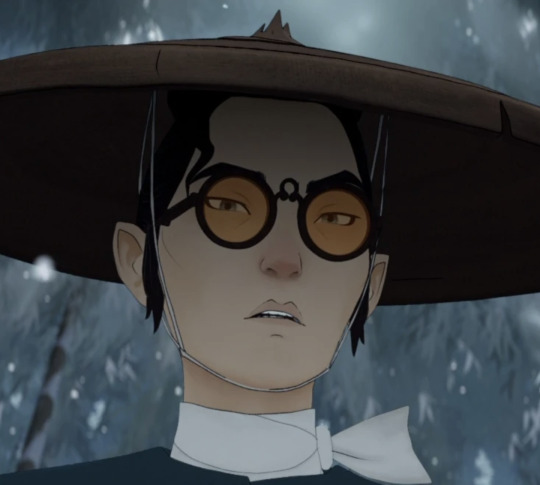
I watched all eight episodes of season 1 of Blue Eye Samurai over the weekend. I then went browsing because I wanted to read some online reviews of the show to see what people were thinking of it and also because I wanted to interact with gifs and art, as the series is visually stunning.
Yet, in my search for opinions on the show, I came across several points I'd like to address in my own words:
Mizu’s history and identity are revealed piece-by-piece and the “peaches” scene with Mizu and Ringo at the lake is intended to be a major character reveal. I think it’s weird that some viewers got angry over other viewers intentionally not gendering Mizu until that reveal, rather than immediately jumping to gender the character as the other characters in the show do. The creators intentionally left Mizu’s gender and sexuality ambiguous (and quite literally wrote in lines to lead audiences to question both) to challenge the viewer’s gut assumption that this lone wolf samurai is a man. That intentional ambiguity will lead to wide and ambiguous interpretations of where Mizu fits in, if Mizu fits in at all. But don't just take my word for this:
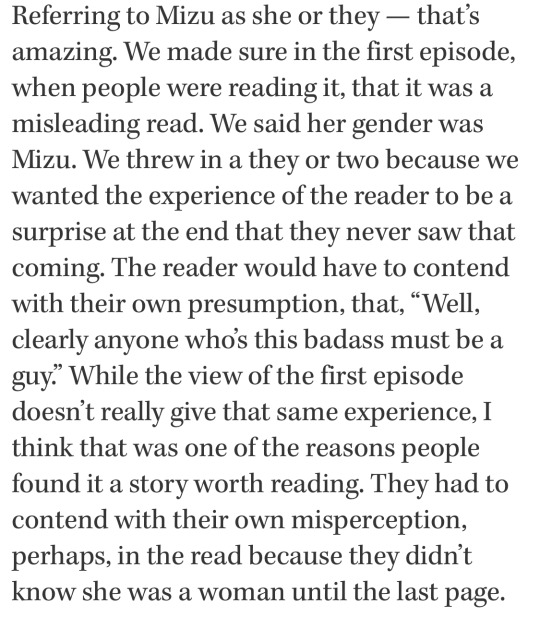
Re: above. I also think it’s weird that some viewers got upset over other viewers continuing to acknowledge that Mizu has a very complicated relationship with her gender, even after that reveal. Canonically, she has a very complicated relationship with her identity. The character is intended to represent liminality in identity, where she’s often between identities in a world of forced binaries that aren’t (widely) socially recognized as binaries. But, again, don’t just take my word for this:
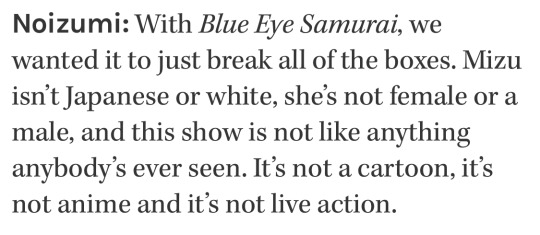
Mizu is both white and Japanese, but she is also not white and not Japanese simultaneously (too white to be Japanese and too Japanese to be white). She’s a woman and a man. She’s a man who’s a woman. She’s also a woman who’s not a woman (yet also not quite a man). But she’s also a woman; the creators said so. Mizu was raised as a boy and grew into a man, yet she was born a girl, and boyhood was imposed upon her. She’s a woman when she’s a man, a man when she’s a man, and a woman when she’s a woman.
Additionally, Mizu straddles the line between human and demon. She’s a human in the sense she’s mortal but a demon in the sense she’s not. She's human yet otherworldly. She's fallible yet greatness. She's both the ronin and the bride, the samurai and the onryō. In short, it’s complicated, and that’s the point. Ignoring that ignores a large part of her internal character struggle and development.
Mizu is intended to represent an “other,” someone who stands outside her society in every way and goes to lengths to hide this “otherness” to get by. Gender is a mask; a tool. She either hides behind a wide-brimmed hat, glasses, and laconic anger, or she hides behind makeup, her dress, and a frown. She fits in nowhere, no matter the identity she assumes. Mizu lives in a very different time period within a very different sociocultural & political system where the concept of gender and the language surrounding it is unlike what we are familiar with in our every-day lives. But, again, don’t just take my word for this:
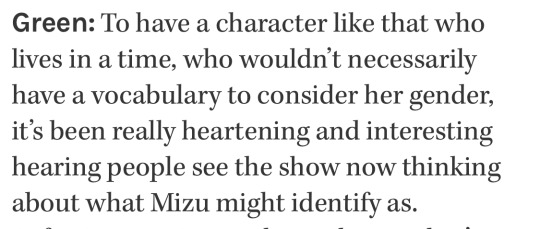
It’s also weird that some viewers have gotten upset over the fact women and queer people (and especially queer women) see themselves in Mizu. Given her complicated relationship with identity under the patriarchy and colonial violence, I think Mizu is a great character for cis-het women and queer folks alike to relate to. Her character is also great for how she breaks the mold on the role of a biracial character in narratives about identity (she’s not some great bridge who will unite everyone). It does not hurt anyone that gender-fluid and nonbinary people see themselves in Mizu's identity and struggle with identity. It does not hurt anyone that lesbians see themselves in the way Mizu expresses her gender. It does not hurt anyone that trans men see themselves in Mizu's relationship with manhood or that trans women can see themselves in Mizu when Mama forces her to be a boy. It's also really cool that cis-het women see themselves in Mizu's struggles to find herself. Those upset over these things are missing critical aspects of Mizu's character and are no different from the other characters in the story. The only time Mizu is herself is when she’s just Mizu (“…her gender was Mizu”), and many of the other characters are unwilling to accept "just Mizu." Accepting her means accepting the complicatedness of her gender.
Being a woman under the patriarchy is complicated and gives women a complicated relationship with their gender and identity. It is dangerous to be a woman. Women face violence for being women. Being someone who challenges sex-prescribed norms and roles under patriarchy also gives someone a complicated relationship with their identity. It is dangerous to usurp gender norms and roles (then combine that with being a woman...). People who challenge the strict boxes they're assigned face violence for existing, too. Being a racial or ethnic minority in a racially homogeneous political system additionally gives someone a complicated relationship with their identity. It is dangerous to be an ethnic minority when the political system is reproduced on your exclusion and otherness. They, too, face violence for the circumstances of their birth. All of these things are true. None of them take away from the other.
Mizu is young-- in her early 20s-- and she has been hurt in deeply affecting ways. She's angry because she's been hurt in so many different ways. She's been hurt by gender violence, like "mama's" misogyny and the situation of her birth (her mother's rape and her near murder as a child), not to mention the violent and dehumanizing treatment of the women around her. She's been hurt by racial violence, like the way she has been tormented and abused since childhood for the way she looks (with people twice trying to kill her for this before adulthood). She's been hurt by state-sanctioned violence as she faces off against the opium, flesh, and black market traders working with white men in contravention of the Shogun's very policies, yet with sanction from the Shogun. She's been hurt by colonial violence, like the circumstances of her birth and the flood of human trafficking and weapons and drug trafficking in her country. She's had men break her bones and knock her down before, but only Fowler sexually differentiated her based on bone density and fracture.
Mizu also straddles the line between victim and murderer.
It seems like Mizu finding her 'feminine' and coming to terms with her 'female side' may be a part of her future character development. Women who feel caged by modern patriarchal systems and alienated from their bodies due to the patriarchy will see themselves in Mizu. They understand a desire for freedom that the narrow archetypes of the patriarchy do not afford them as women, and they see their anger and their desire for freedom in Mizu. This, especially considering that Mizu's development was driven by one of the creators' own experiences with womanhood:
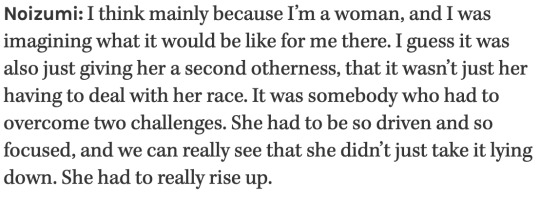
No, Mizu does not pass as a man because she "hates women" or because she hates herself as a woman or being a woman. There are actual on-screen depictions of Mizu's misogyny, like her interactions with Akemi, and dressing like a man is not an instance of this. Mizu shows no discomfort with being a woman or being seen as a woman, especially when she intends to pass herself as and present as a woman. Mizu also shows the women in the series more grace and consideration than any man in the show, in whatever capacity available to her socially and politically, without revealing herself; many of the women have remarked that she is quite unlike other men, and she's okay with that, too.
When she lives on the farm with Mama and Mikio, Mizu shows no discomfort once she acclimates to the new life. But people take this as conclusive evidence of the "only time" she was happy. She was not. This life was also a dance, a performance. The story of her being both the ronin and the onryō revealed to the audience that this lifestyle also requires her to wear a mask and dance, just as the bride does. This mask is makeup, a wedding dress, and submission, and this performance is her gender as a wife. She still understands that she cannot fully be herself and only begins to express happiness and shed her reservation when she believes she is finally safe to be herself. Only to be betrayed. Being a man is her safety, and it is familiar. Being a boy protected her from the white men as a child, and it might protect her heart now.
Mizu shows no discomfort with being known as a woman, except when it potentially threatens her goals (see Ringo and the "peaches" scene). She also shows no discomfort with being known as, seen as, or referred to as a man. As an adult, she seems okay- even familiar- with people assuming she's a man and placing her into the role of a man. Yet, being born a girl who has boyhood violently imposed upon her (she did not choose what mama did to her) is also an incredibly important part of her lived experience. Being forced into boyhood, but growing into a man anyway became part of who she is. But, being a man isn’t just a part of who she became; it’s also expedient for her goals because men and women are ontologically different in her world and the system she lives under.
She's both because she's neither, because- ontologically- she fits nowhere. When other characters point out how "unlike" a man she is, she just shrugs it off, but not in a "well, yeah, because I'm NOT a man" sort of way, but in an "I'm unlike anyone, period," sort of way. She also does not seem offended by Madam Kaji saying that Mizu’s more man than any who have walked through her door.
(Mizu doesn’t even see herself as human, let alone a woman, as so defined by her society. And knowing that creators have stated her future arc is about coming into her “feminine era” or energy, I am actually scared that this show might fall into the trope of “domesticating”/“taming” the independent woman, complete with an allegory that her anger and lack of human-ness [in Mizu’s mind] is a result of a woman having too much “masculine energy” or being masculine in contravention of womanness.)
Some also seem to forget that once Mama and Mikio are dead, no one knows who she is or where she came from. They do not have her background, and they do not know about the bounty on her (who levied the bounty and why has not yet been explained). After their deaths, she could have gone free and started anew somehow. But in that moment, she chose to go back to life as a man and chose to pursue revenge for the circumstances of her birth. Going forward, this identity is no longer imposed upon her by Mama, or a result of erroneous conclusions from local kids and Master Eiji; it was because she wanted people to see her as a man and she was familiar with navigating her world, and thus her future, as a man. And it was because she was angry, too, and only men can act on their anger.
I do think it important to note that Mizu really began to allow herself to be vulnerable and open as a woman, until she was betrayed. The question I've been rattling around is: is this because she began to feel safe for the first time in her life, or is this part of how she sees women ontologically? Because she immediately returns to being a man and emotionally hard following her betrayal. But, she does seem willing to confide in Master Eiji, seek his advice, and convey her anxieties to him.
Being a man also confines Mizu to strict social boxes, and passing herself as a man is also dangerous.
Mizu doesn't suddenly get to do everything and anything she wants because she passes as a man. She has to consider her safety and the danger of her sex being "found out." She must also consider what will draw unnecessary attention to her and distract her from her goals. Many viewers, for example, were indignant that she did not offer to chaperone the mother and daughter and, instead, left them to the cold, only to drop some money at their feet later. The indignity fails consider that while she could bribe herself inside while passing as a man, she could not bribe in two strangers. Mizu is a strange man to that woman and does not necessarily have the social position to advocate for the mother and daughter. She also must consider that causing small social stirs would distract from her goals and draw certain attention to her. Mizu is also on a dangerous and violent quest.
Edo Japan was governed by strict class, age, and gender rules. Those rules applied to men as well as women. Mizu is still expected to act within these strict rules when she's a man. Being a man might allow her to pursue revenge, but she's still expected to put herself forward as a man, and that means following all the specific rules that apply to her class as a samurai, an artisan (or artist), and a man. That wide-brimmed hat, those orange-tinted glasses, and her laconic tendencies are also part of a performance. Being a boy is the first mask she wore and dance she performed, and she was originally (and tragically) forced into it.
Challenging the normative identities of her society does not guarantee her safety. She has limitations because of her "otherness," and the transgression of sex-prescribed roles has often landed people in hot water as opposed to saving them from boiling. Mizu is passing herself off as a man every day of her life at great risk to her. If her sex is "found out" on a larger scale, society won’t resort to or just start treating her as a woman. There are far worse fates than being perceived as a woman, and hers would not simply be a tsk-tsk, slap on the wrist; now you have to wear makeup. Let's not treat being a woman-- even with all the pressures, standards, fears, and risks that come with existing as a woman-- as the worst consequence for being ‘found out’ for transgressing normative identity.
The violence Mizu would face upon being "found out" won’t only be a consequence of being a "girl." Consider not just the fact she is female and “cross-dressing” (outside of theater), but also that she is a racial minority.
I also feel like many cis-het people either ignore or just cannot see the queerness in challenging gender roles (and thus also in stories that revolve around a subversion of sex-prescribed gender). They may not know how queerness-- or "otherness"-- leads to challenging strict social stratifications and binaries nor how challenging them is seen by the larger society as queer ("strange," "suspicious," "unconventional," even "dishonorable," and "fraudulent"), even when "queerness" (as in LGBTQ+) was not yet a concept as we understand it today.
Gender and sexuality- and the language we use to communicate who we are- varies greatly across time and culture. Edo Japan was governed by strict rules on what hairstyles, clothes, and weapons could be worn by which gender, age, and social group, and this was often enshrined in law. There were specific rules about who could have sex with whom and how. These values and rules were distinctly Japanese and would not incorporate Western influences until the late 1800s. Class was one of the most consequential features to define a person's fate in feudal Japan, and gender was quite stratified. This does not mean it's inappropriate for genderqueer people to see themselves in Mizu, nor does this mean that gender-variant identities didn’t exist in Edo Japan.
People in the past did not use the same language we do today to refer to themselves. Example: Alexander The Great did not call himself a "bisexual." We all understand this. However, there is a very weird trend of people using these differences in language and cultures across time to deny aspects of a historical person's life that societies today consider taboo, whether these aspects were considered taboo during that historical time period or not. Same example: people on Twitter complaining that Netflix "made" Alexander The Great "gay," and after people push back and point out that the man did, in fact, love and fuck men, hitting back with "homosexuality wasn't even a word back then" or "modern identity didn't exist back then." Sure, that word did not exist in 300s BCE Macedonia, but that doesn't mean the man didn't love men, nor does that mean that we can't recognize that he'd be considered "queer" by today's standards and language.
Genderqueer, as a word and as the concept is understood today, did not exist in feudal Japan, but the people did and feudal Japan had its own terms and concepts that referred to gender variance. But while the show takes place in Edo Japan, it is a modern adult animation series made by a French studio and two Americans (nationality). Mizu is additionally a fictional character, not a historical figure. She was not created in a vacuum. She was created in the 21st century and co-written by a man who got his start writing for Sex in the City and hails from a country that is in the midst of a giant moral panic about genderqueer/gender-variant people and gender non-conforming people.
This series was created by two Americans (nationality) for an American company. In some parts of that country, there are laws on the book strictly defining the bounds of men and women and dictating what clothes men and women could be prosecuted for wearing. Changes in language and identity over time mean that we can recognize that if Mizu lived in modern Texas, the law would consider her a drag performer, and modern political movements in the show creators' home country would include her under the queer umbrella.
So, yeah, there will also be genderqueer people who see themselves in Mizu, and there will be genderqueer fans who are firm about Mizu being queer to them and in their “headcanons.” The scene setting being Edo Japan, does not negate the modern ideas that influence the show. "Nonbinary didn't exist in Edo Japan" completely ignores that this show was created to explore the liminality of modern racial, gender, class, and normative identities. One of the creators was literally inspired by her own relationship with her biracial identity.
Ultimately, the fact Mizu, at this point in her journey, chooses to present and pass as a man and the fact her presented gender affects relationship dynamics with other characters (see: Taigen) gives this story a queer undertone. And this may have been largely unintentional: "She’s a girl, and he’s a guy, so, of course, they get together," < ignoring how said guy thinks she’s a guy and that she intentionally passes herself as a guy. Audiences ARE going to interpret this as queer because WE don’t live in Edo-era Japan. And I feel like people forget that Mizu can be a woman and the story can still have queer undertones to it at the same time.
#Blue Eye Samurai#‘If I was transported back in time… I’d try to pass myself off as a man for greater freedom.’#^^^ does not consider the intersection of historically queer existence across time with other identities (& the limitations those include)#nor does it consider the danger of such an action#I get it. some come to this conclusion simply because they know how dangerous it is to be a woman throughout history.#but rebuking the normative identities of that time period also puts you at great risk of violence#challenging norms and rules and social & political hierarchies does not make you safer#and it has always been those who exist in the margins of society who have challenged sociocultural systems#it has always been those at greatest risk and who've faced great violence already. like Mizu#Anyway... Mizu is just Mizu#she is gender queer (or gender-variant)#because her relationship with her gender is queer. because she is gender-variant#‘queer’ as a social/political class did not exist. but people WE understand as queer existed in different historical eras#and under different cultural systems#she’s a woman because queer did not exist & ‘woman’ was the sex caste she was born into#she’s also a woman because she conceptualizes herself as so#she is a woman AND she is gender-variant#she quite literally challenges normative identity and is a clear example of what sex non-conforming means#Before the actual. historic Tokugawa shogunate banned women from theater#there were women in the theater who cross-dressed for the theater and played male roles#so I’m also really tired of seeing takes along the lines of: ‘Edo Japan was backwards so cross dressers did’t exist then!’#like. please. be more transparent won’t you?
21 notes
·
View notes
Text
i've been thinking a lot about how the need for efficiency can contribute to dangerous driving. it isn't the only factor, of course, but there's this desire to get things done as fast as possible, and get mad at people for having the audacity to not go at your pace. people honking as soon as the light turns, running lights, not bothering to properly check before going at intersections, cutting people off, to name some common examples. it's a manifestation of "time is money" and we have to rush things. in all cases, including driving, impatience is often discourteous, but with driving it can also become deadly.
#not really a point to this it's just been on my mind and last reblog just brought it up to me again#obligatory yes i know there are cases where people make honest mistakes or have other things going on that are in fact time sensitive#and that driving too slowly or overly cautiously can also be dangerous and cause accidents#but overall i'm just commenting on how especially in the city there's this mindset of going fast all the time.#like. we can and should practice taking a few extra seconds to let someone cross the road.#this applies to pedestrians too! like too often i see ppl running out onto really fast oncoming traffic!!#like yeah jaywalk if there aren't many cars or they're far off down the road or the light is just turning. whatever.#but ppl will cross in the middle of streets across several lanes of traffic that is going. so fast. like let's wait a little bit yeah?#the road may be hostile to pedestrians and designed in a way that doesn't account for how we need to cross#but the way ppl will refuse to wait a few seconds for the walk light on intersections with walk lights#or walk the few meters to get to the intersection. it's endangering and for what? to stick it to the car drivers? to shave 30 seconds?#idk. just think we need to all slow down a bit. it's ok to take time to do things.#before we had standardized time and shit i don't think ppl got this mad that someone showed up to a scheduled thing 16 insect chirps late#it's really annoying that everyone feels this sense of urgency all the time even when there isn't anything truly urgent happening#not on an individual sense but in a societal one. it's baked in with the capitalism and all.#they speak!
2 notes
·
View notes
Text
Therapeutically categorizing and assigning names / narrative themes to the differently felt emotional and material chapters of one's own life, even including stuff that didn't even necessarily happen to you personally or even occur in reality, such as the events of video games you've played or even vague bouts of imagined nostalgia and suchlike, not even doing so strictly chronologically but as separate concurrent streams of memories that occurred over weeks or months alongside one's ordinary life.
#my writing#is doing or wanting to do this normal by the way? or rather I know it's weird but like. is it dangerous? does it freak you out?#Is it weird 2 play some kinda game n then mentally categorize it as living an alternative life that intersected with ones own for mere days
4 notes
·
View notes
Text
🐈
#ooh I have a lot of thoughts about Six and Charley and her mysteriousness and how he responds to it#but they intersect with my Six's Mental Health Thoughts which are extremely headcanony#and I know a lot of the fandom would rather just kind of wall off Twin Dilemma and assume Six's proper characterization doesn't include it#and I don't know that I blame them for that#but I like trying to make things fit together#and also there's no way to do that without probably misusing real-world mental health terminology#because (watsonian) the doctor is an alien with an alien brain and (doylist) the writers do not know all that much about psychiatry#but. at least for a bit after his regeneration he deals with paranoia right?#like that's the term the narrative uses. (and it clearly explains his attack on peri - he's perceiving her as a threat due to delusion)#& she says 'I'm not letting a manic depressive paranoid personality like you shut me up' & he objects specifically to 'manic depressive'#later in uhhhh revelation of the daleks? he doesn't tell her about a real danger#and he says 'I didn't want to burden you with what might have been a piece of paranoid speculation on my part'#again I cannot emphasize enough how much I am talking about a fictional character with fictional problems. I do not know psychiatry either!#I do not want to mislead#but one of this character's problems is that he has a badly calibrated sense of danger. sometimes he sees things as threatening that aren't#and sometimes he overcompensates for that#and I think when he first meets Charley he is really not very sure whether he should trust the alarm bells he's hearing or not#she seems deeply suspicious! but also nice? he wants to like her? but deeply suspicious!#'or am I just being crazy?' he asks himself#and so he just kind of... keeps watching her#also unrelatedly to all that I think he kind of likes having the excuse of Mystery for doing what he does anyway which is orbiting her#just slightly obsessing over his companion at the time even if he also occasionally forgets they're there#(he's just very all or nothing in everything all the time)#but yeah. you know how 11 gets about Clara and her Mystery Plotline? 6 is like that about every companion in turn anyway#so he doesn't actually mind having the excuse of Mystery with Charley#this is also why 6 and Clara is so compelling#(this was a tag essay in response to lrb but I decided it was opening too many cans of worms and needed its own post)
22 notes
·
View notes
Text
got so fucking annoyed with the stoplight near my house taking 10 fucking minutes to turn green at night that i emailed the city abt it. my 2am activism 😤
#i’m the laziest goddamn asshole on earth but turns out if you piss me off consistently when i am trying to get home at 2am#then i will write a whole ass email to the city abt it to complain#i doubt they’ll do anything abt it but it would be nice if they did#i keep seeing ppl run the light bc they don’t wanna wait for it to turn (which i Understand Completely)#but it’s already a dangerous intersection as it is i would hate for the stupid light to cause more needless accidents#sighs.#wade talks#personal
3 notes
·
View notes
Text
i’m car shopping rn and trying to balance my desire for a cutie 1985-95 car like a celica or honda crx or vw cabriolet or even a collectible lada sputnik with the knowledge that a single impact from someone’s ford f250 or even some mom’s crossover suv would cream me. i would be the crumple zone.
#crx gets incredible mileage because it’s super light despite being the same size as a modern accord#but it’s notoriously dangerous#cabriolets after a certain year have roll bars and side airbags so they’re safe but some parts are hard to find#celicas are good except for the insane rust problems#like my commute to job 1 is less than 5 miles each way and like 12 each way to job 2#so i’m not driving much it’s just that i drive through an intersection that’s notorious for accidents and i even got in an accident there so#but also the vibes#and some classics aren’t that $$$ even though i know id be putting a lot of time and money into them after
2 notes
·
View notes
Text
So my city has managed to find a way (two ways actually) to make the use of multi-use trails in in lieu of bike lanes even more horrific than that initial phrase sounded.
They aren't continuous. The trail ended. I realised after I rejoined the rest of traffic that what the city expected the kids and other people who weren't up for regular cycling (no bike lane at all) to do was to *cross the road* and bike on that side. (This isn't the only place in the city where there's one multi-use trail for a road, so you have to bike against traffic, but at least the other one doesn't have that sudden ending.)
On the same trip I came to the end of a bike lane (I won't even bother complaining about that bike lane, because it's nothing compared to the trail I had to take). It was properly signed and everything, I moved over to the big lane. (My kids could have done this by the way, there was almost no traffic, I don't want to hear from people who like to pretend that it's infrastructure rather than cultural support and good drivers who dictate if people ride bikes claiming that having to ride normally was a problem.) As I cross the intersection (remember, there was no other traffic - I was right up at the stop line), I see that there's a multi-use trail starting on the other side.
With no curb cut.
#yes I might have considered a “hop and walk” at the intersection#if I had known that the trail was there#but I generally don't find#that failing to suffer through a multi-use trail#is as dangerous as not using other cycling infrastructure#I don't know if the drivers understand better that that's BS#or they just don't notice it they way they notice fake bike lanes#and so they don't take it out on me
6 notes
·
View notes
Text

Three wētā!!
I don’t know what it is they love so much about this corner but I am here for it
#lizard must be busy tonight#which is probably for the best because apparently those lizards eat wētā#it’s a dangerous intersection
2 notes
·
View notes
Text
.
#FUCK. I JUST REALIZED HOW HARD I'VE BEEN SUPPRESSING ANY HINT OF DESIRE OR WANT FOR WOMEN#which.. probably obvious to an external view. fucking hell. oblivious in my own mind though.#tag talk#like. the whole “seen as a predator” thing. the fun intersection of “men dangerous to women” and “lesbians infiltrating women's spaces”#ughhhh oof I'm gonna throw something. I wanna flirt with women but men feel like the only safe option.#I can flirt with nonbinary femboy trans women just fine but binary trans women feel off limits because suddenly it's the archetypal dynamic#men are safe to flirt with and women are not. because of perceived dynamics as they were taught to me.#I can't believe I was kind of right back in high school when I was like “maybe I'm gay because women are scary to me”#it's not women. it's the social stigma around liking women. the inherent predator status you inheret by showing interest in women.#ugh I'm so fucked up and I'm still figuring so much shit out. like. baby girl you resonate with the monstrous feminine this shouldbe obvious#whelp. guess I process this now.#thinking about it because I was thinking about trying to figure out whether someone has been flirting with me#and the idea of flirting back was suddenly terrifying and I sat down to analyze why that is. and uh. found an answer#maybe not the only answer. but certainly an answer
1 note
·
View note
Text
#apologies about the funky language#there's a ton of these going on in different locations#so if hypothetically someone wanted to attend one of these...#btw at least for the Bay Area ones they've got statements about#being committed to non-violence and having peacekeepers#so this is not a smash stuff sort of protest#and should be pretty low risk for arrest or idk getting hit by rubber bullets or w/e#a certain individual is not interested in playing by the rules so I can't promise that going to one of these#won't make you a 'political dissident' sort of target#but if you're posting leftist stuff on social media in a way that is at all traceable to your real name#that ship has sailed#and only dissenting online will not provide safety#now if you are considering going to a protest that is likely to involve#property distraction or blocking intersections or other illegal activities#you want to be discrete about that#but this is a legal protest#and participating and letting people know you are participating#should not be more dangerous than any other form of voicing objection to orange julius
0 notes
Text
Fist bump to @chaudskis from someone else working in cleanup.
People ARE cleaning this shit up! Lots of people. It's long and slow and maybe more exciting to say no one's doing anything. And there are all sorts of contaminated sites where no one is doing anything yet, because there are bigger fish to fry.
Using it to make paints is a neat way to bring attention to cleanup work! Gamblin isn't cleaning up, though; it's using a byproduct.
The other thing to remember is that the dose makes the poison. Some things are hella toxic in very small quantities. Iron oxides aren't. They're a problem because you've got a shit-ton dissolved in highly acidic water; the pH causes problems, the oxides settling out can smother stuff because there's just so much, and other more dangerous metals can be in there too — but iron oxides on their own make a very safe art supply. The world's oldest, in fact — the ochres!
If you're into oils, you can buy the paints and not worry. About half my oil paints are Gamblin; they make nice stuff! Given that these are earth colors, I'd expect them to behave like ochres/umbers in oils; they'll dry more quickly than the brighter artificial colors. For safety, thin with Gamsol/high-quality-oderless-mineral-spirits, but rinse between colors with walnut oil instead of solvent. I switched to this last time I oil painted and it worked great. If you use these colors the sludge on the bottom doesn't have to be treated as toxic, but a whole lot of other colors do (the danger colors are beautiful).
So what this paint company does is take iron pollution from abandoned mines that are polluting soils and rivers and makes iron based red pigment paints out of it.


Basically they realized hey no one's cleaning this shit up, it's polluting the streams, killing all the fish, making the water undrinkable and there's a huge market for it so why not make money by cleaning it the fuck up?

They remove this stuff by the industrial bucket load from the rivers. The idea is if it's in a painting, if it's in your home, it's not poisoning wildlife.


anyway its cool as shit, please support tf out of these people https://gamblinstore.com/reclaimed-earth-colors-set/
#environmental cleanup#toxic cleanup#abandoned mine program#art supplies#oil painting#pigments#the intersection of two of my worlds#I love it#When we get new site managers I test their sense of humor#by talking about the beautiful danger colors leaking out of mines#(not these but like HELLA COPPER or cobalt or cadmium)#and/or by claiming that growing up in Tacoma gave me a natural immunity to lead and arsenic#Do they laugh or get concerned?#I suppose if I'd had more childhood lead exposure I might believe that was how it worked#...imagine how smart I'd be if I hadn't had any :(
72K notes
·
View notes
Text
Can wotr stop rotating in my brain for like a second
#not ACTUALLY complaining but im trying to draw something else 😭😭#Anyway if you're curious im going crazy about Daeran's not-a-date line 'i wonder i'f ill come to regret this- you're dangerous I know it'#& how that effects ellu in particular. ignore me frothing at the mouth it's a very normal scene I assure you( i need to redraw it yesterday#and a bunch of other ellu backstory things but im always going crazy about those#As a character he's just so. I dont even know#'problematic' representation of ugly mental illness is something that can be so personal#insert an intersection of the madman as the monster trope (bad) with the monster as something sympathetic trope#something worthy of being loved- doomed as it is#not to paraphrase Basil Hallward but i think i've put a bit too much of myself in that one and anyone that looks too close could see it#h
1 note
·
View note